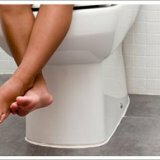Constipation in pregnant women: what to do?

It's unlikely that anyone will argue that the pregnancy period is a wonderful time in a woman's life: after all, the future mother lives in expectation of a miracle.But the fact that this period of life can be associated with many problems in the health of a lady is also not a secret for anyone: too much burden has to be borne by the body.One of the problems during pregnancy is a violation of the intestine, namely, constipation.
In general, even without pregnancy, the female body is predisposed to constipation due to its anatomical structure.First, the length of the large intestine in women is greater than that of men.Secondly, there is a direct relationship between menstruation and bowel movement: even in absolutely healthy women before menstruation often there are constipation.Third, women have a much higher sensitivity of internal organs to external and / or internal stimuli.That is why the frequency of constipation in women is almost three times higher than that of men.
Table of Contents: Pregnancy and constipation Causes and consequences of constipation during pregnancy Non-drug treatment of constipation in pregnant women Drug therapy The characteristics of different laxativesPregnancy and constipation
Constipation specifically in the period of bearing a child takes place to be in 17-50% and, likeUsually, such a malfunction in the intestine at 17-36 week.Most often, doctors note the development of functional constipation, and this means that they have emerged exclusively against the background of pregnancy and immediately after giving birth the bowel work will fully recover.Speaking of functional constipation, future mothers should know that in this case, blood and mucus will be absent in the feces, and the general state of health will be excellent.
Causes, risk factors and consequences of constipation during pregnancy
Physicians are well aware that the risk factors for developing constipation during pregnancy are:
- excess weight / obesity;
- is a sedentary lifestyle;
- the age of a woman is above 35 years;
- stress;
- is often in a bad mood.
But the main cause of constipation in pregnant women is still an increase in the hormone progesterone and its derivatives.In principle, this is a normal process - a large amount of progesterone in the body of a woman during childbearing is necessary for lowering the tone of the uterine muscles and maintaining pregnancy.But at the same time with such a positive effect, the hormone progesterone also has an effect on the musculature of the intestine - the tone significantly decreases, the contractile activity of the intestine decreases, which leads to constipation.
Other causes of intestinal dysfunction during pregnancy include:
-
 Some medicines that the pregnant woman takes as prescribed by the doctor - calcium or iron preparations, hormonal drugs;
Some medicines that the pregnant woman takes as prescribed by the doctor - calcium or iron preparations, hormonal drugs; - decrease in the production of motilin is a substance that stimulates the motor activity of the intestine;
- cardinal change in addiction to foods - pregnant women often have a craving for food rich in protein and fat, but with a low amount of fiber;
- in the body significantly increases the amount of relaxin - a substance that relaxes the muscles of the gut;
- the forced restriction of a woman's food and water - this, by the way, can occur and for medical reasons;
- the exerting pressure on the intestine from the outside by the growing uterus;
- low-activity lifestyle of a pregnant woman;
- increase of estrogens - they make the absorption of water and minerals from the intestine more active, which makes the feces dry and dense.
Many women refer to the appearance of functional constipation during pregnancy lightly - "the face and everything will pass." Actually such disruption of the intestine can lead to very unpleasant consequences:
- development of hemorrhoids or its aggravation in case of an existing disease;
- the level of intestinal permeability for allergens and infectious agents is significantly increased;
- microbial flora of the intestine and genital tract can become more active, and this significantly increases the risk of complications of further pregnancy, childbirth and the postpartum period;
- there is a threat of miscarriage - with constipation a woman is forced to often and strongly push, and this automatically increases the tone of the uterus.
A pregnant woman with chronic constipation rarely gives birth naturally, as doctors prefer to do a cesarean section for such patients.Often, such future mothers begin premature birth, and the period between birth and the first emptying of the intestine will be longer than in other parturient women.
Non-drug treatment of constipation in pregnant women
Of course, taking any medication during pregnancy is only necessary for the doctor's prescription.But with chronic constipation gynecologists do not hurry to do medicamental appointments, because it is much easier and safer to adjust the nutrition and regime of the day. Such corrective measures for constipation in pregnant women include :
- increase in physical activity - this recommendation can only be given by a specialist, as one must be sure that pregnancy proceeds without deviations and the woman is only concerned with constipation;
- correction of drinking regimen: a woman should drink at least 8 glasses of liquid a day, but again it should be extremely cautious - swelling should be completely absent;
- restricting the consumption of sweets, muffins, white bread, vermicelli, blueberries, black tea and bird cherry;
- increase in the menu quantity of foods that are rich in fiber - dried fruits, leafy greens, legumes, bran, berries;
- to eat often, but in small portions( fractional food).

If the above measures were effective and the intestines in the pregnant woman began to be emptied regularly and fully, then they remain basic until delivery.Otherwise, doctors can resort to medical treatment.
Drug Therapy
 In the pharmacies of any locality you can find a lot of laxatives, but it is specifically for pregnant women to choose an absolutely safe medication - it should not harm either the fetus or the future mummy, but the benefit from it should be much greaterPossible harm.The therapeutic effect of the chosen laxative action should be manifested even in minimal dosages, the duration of treatment should also be small.
In the pharmacies of any locality you can find a lot of laxatives, but it is specifically for pregnant women to choose an absolutely safe medication - it should not harm either the fetus or the future mummy, but the benefit from it should be much greaterPossible harm.The therapeutic effect of the chosen laxative action should be manifested even in minimal dosages, the duration of treatment should also be small.
Please note: pregnant women should avoid the use of any, including laxatives, medicines at the gestation period of 3-11 weeks, since it is during this period that their maximum impact on the future baby is marked.
Features of different laxatives
There are several groups of drugs that have a laxative effect.
Osmotic laxatives
These include lactulose, magnesia, polyethylene glycol and phosphate salts. The main advantages of this group of laxatives are that they:
- is almost not absorbed from the intestine and does not penetrate the fetal blood;
- does not lead to addiction;
- prevents the loss of salts.However, there are some drawbacks in osmotic laxatives:
- it is difficult to select an effective dose - it can take a long time, which the pregnant woman does not have;
- can provoke short-term bloating and the appearance of unintentional pain in the intestines;
- with long-term use can lead to violations of water-salt balance in the body;
- can cause diarrhea in a newborn.
In addition, polyethylene glycol is extremely rare, but it can provoke an inadequate reaction of the body - pulmonary edema, respiratory failure and coma.Therefore, the considered group of laxatives should be prescribed only by a doctor, a woman should take them under the supervision of medical personnel.
Bulk laxatives
These include psyllium, dietary supplements with bran in the composition and methylcellulose.The advantages of such drugs include the lack of absorption in the mother's blood and the ability to increase the number of healthy bacteria in the intestinal microflora. But it is worth considering some of the drawbacks of bulk laxatives:
- the curative effect develops extremely slowly;
- needs a dose adjustment on an individual basis;
- can cause bloating and weak pain in the intestines;
- require the intake of a large amount of fluid - this can provoke the development of edema in a pregnant woman;
- significantly reduce appetite;
- may cause severe allergic reactions.
In principle, the considered form of medicines with a laxative effect can be resolved to be taken by pregnant women, but this should be done by a specialist.
Softening Feces
These include petrolatum, mineral oils, glycerin, microlux and others.Means that soften the feces greatly facilitate the actual act of emptying the intestine.Are characterized by rapid action, are considered very relevant for proctologic problems( for example, a pregnant woman began exacerbation of chronic hemorrhoids), which are accompanied by soreness in the anus.But with all the positive qualities, laxatives, softening the feces, are not at all harmless for pregnant women! They:
- are able to accumulate in the spleen, intestinal wall and liver - this can provoke the development of the inflammatory process;
- may interfere with the absorption of fat-soluble vitamins in the mother - this is a risk factor for bleeding in both the mother and the baby;
- contribute to an increase in the tone of the uterus;
- can damage the rectal mucosa;
- provokes proctitis.
Most often, this negative effect is exerted by mineral oils, so they are generally strictly prohibited for use during pregnancy.All other drugs that soften feces can be used, but only briefly and sporadically.
Stimulating laxative
This castor oil, and glycerin suppositories, and the fruits of the zoster, and Senna and many others - this group of laxatives is the largest.All stimulating laxatives prevent the hardening of the stool, provide a quick and effective evacuation of the intestine. But at the same time they also have a negative effect on the body of a pregnant woman:
- can be absorbed through the intestinal wall and penetrate the blood of a future child;
- can provoke the development of malformations in the baby;
- significantly increases the risk of abortion, as stimulate the muscles of the uterus;
- may provoke the appearance of intestinal colic;
- when used in the wrong dosage leads to chronic diarrhea;
- can be addictive;
- provokes proctitis development.
In connection with this future mothers are strictly forbidden to use castor oil, from the group of stimulant laxatives it is allowed to take preparations with hay, bisakodil, candles and docusate sodium.
Please note: laxatives during pregnancy are only used in the absence of a positive effect after changing the diet and day regimen.In this case, drug therapy is appointed a short course( no more than 10 days) and strictly with individual selection of a specific remedy.
Constipation during pregnancy is not only an unpleasant phenomenon, but also quite dangerous for the health of the future mother, for the health of the baby, and for the course of pregnancy.Therefore, in the event of such a problem, it may be advisable to seek the help of a specialist.
Tsygankova Yana Aleksandrovna, medical reviewer, therapeutist of the highest qualification category



